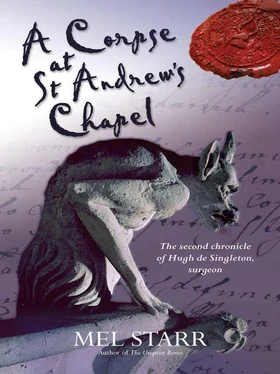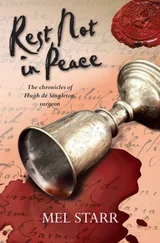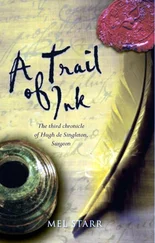Mel Starr - A Corpse at St Andrew's Chapel
Здесь есть возможность читать онлайн «Mel Starr - A Corpse at St Andrew's Chapel» весь текст электронной книги совершенно бесплатно (целиком полную версию без сокращений). В некоторых случаях можно слушать аудио, скачать через торрент в формате fb2 и присутствует краткое содержание. Год выпуска: 2010, Издательство: Kregel Publications, Жанр: Исторический детектив, на английском языке. Описание произведения, (предисловие) а так же отзывы посетителей доступны на портале библиотеки ЛибКат.
- Название:A Corpse at St Andrew's Chapel
- Автор:
- Издательство:Kregel Publications
- Жанр:
- Год:2010
- ISBN:нет данных
- Рейтинг книги:5 / 5. Голосов: 1
-
Избранное:Добавить в избранное
- Отзывы:
-
Ваша оценка:
- 100
- 1
- 2
- 3
- 4
- 5
A Corpse at St Andrew's Chapel: краткое содержание, описание и аннотация
Предлагаем к чтению аннотацию, описание, краткое содержание или предисловие (зависит от того, что написал сам автор книги «A Corpse at St Andrew's Chapel»). Если вы не нашли необходимую информацию о книге — напишите в комментариях, мы постараемся отыскать её.
A Corpse at St Andrew's Chapel — читать онлайн бесплатно полную книгу (весь текст) целиком
Ниже представлен текст книги, разбитый по страницам. Система сохранения места последней прочитанной страницы, позволяет с удобством читать онлайн бесплатно книгу «A Corpse at St Andrew's Chapel», без необходимости каждый раз заново искать на чём Вы остановились. Поставьте закладку, и сможете в любой момент перейти на страницу, на которой закончили чтение.
Интервал:
Закладка:
“He does, though not what a man might expect.” Master John turned a page and squinted at the script through narrowed eyes. “Ah…here…‘Behold the proud, his soul is not upright in him; but the just shall live by his faith.’”
“Is this the antidote to evils? That a just man live by his faith?” My bewilderment was evident in my voice.
“Ah, Hugh, do you not see? All these evils perplexed the world then as they do now. How can a just man fight them? Can a man reform the world?”
“Unlikely, what I’ve seen of it.”
“True. Yet a man must do battle against wrong when and where he can, if God grants him courage for the struggle, as He has you, I think.”
“But I will not win that fight, will I? See all those of the past who fought valiantly against wickedness, but evil yet grips the world and shows no sign of letting go.”
“It does,” Wyclif agreed, “and will until God sends His Son to return.”
“What, then? Must a man strive and yet know he will face defeat in the end?”
“What is defeat? When a man comes to his grave, having done all he can to serve God and man, will he not inherit an eternal place with God? Is that not victory?”
“Aye,” I agreed, “but long delayed.”
“Well,” Wyclif laughed, “most men hope ’twill be long delayed.”
“So until that final victory a virtuous man must live in an earthly struggle he will surely lose?”
“Not so, Hugh. Do not be so melancholy. ‘The just shall live by faith.’ The apostle Paul says much the same thing in his letter to the Ephesians. Though the devil and his minions do their worst, the just man will live because of his faith.”
“Even should one of satan’s minions slay him?”
“Even so. His faith will grant him life on earth, and in the world to come.”
“What of a man’s deeds?”
“The prophets all speak of righteous living. ’Tis expected of a man.”
“Will a man then live also by his deeds?”
“Perhaps,” Wyclif mused. “But actions seldom bring a man to faith.”
“Whereas faith will spur a man to act,” I completed his thought.
“Aye.”
“’Tis my faith in you has brought me to your door,” I added. “I have faith you will provide me a place to sleep this night, as you did two days past.”
“Your faith will be rewarded. Have you supped?”
“No. I thought to seek an inn before I retire.”
“The streets are dark. Best I send you to the kitchen. The cook will have something for you.”
He did, and a loaf for my breakfast, as well.
I slept well, and in the morning retrieved Bruce from the stable behind the Stag and Hounds. I had set out for Bampton when a thought caused me to pull on the reins and turn the old horse toward Holywell Street. I should visit my patient before I depart. This duty was made more satisfying with the knowledge that the stationer’s daughter might be present. She was, and greeted me when I entered the shop. Her father was not at hand.
“I have come to see your father before I return to Bampton,” I announced. I looked about the empty shop, worried that the man was suffering ill effects from the surgery. “Is he yet in his bed this morning?”
The girl laughed. “Nay. Come and see.”
I followed her through the door to the workroom, and from there could see through the open door into the toft. The stationer was there, plying a spade.
“He awoke this morning and decided ’twas not too late to plant vegetables. He has been at the work for an hour already.”
The stationer saw us standing in the door and ceased his labor. He brushed a lock of his thinning hair from his sweating forehead, leaned on the spade, and grinned at me. “I thought I would never sow a garden again.”
“The wound does not trouble you?” I asked. I was startled to see him so employed less than a day after I had sliced into his ribs.
“’Tis a bit sore, and I was stiff when I rose from my bed. But this,” he looked about him at the earth he had turned, “has worked out much of the ache.”
Caxton must have seen the surprise in my eyes and mistook it for concern. His countenance fell, and he added, “Have I done wrong, to engage in this work so soon?”
The stationer had stripped off his cotehardie and worked in his kirtle. I looked to his back to see if the linen was stained but no discharge from the wound was evident on the fabric.
“If there is little pain I think you do well. But you must not exert yourself so that the stitches tear. As I said yesterday, I will return in a fortnight to remove the sutures. Even after that there is some danger that the wound may reopen.”
“So I should lay down my shovel, then?”
“No. But do the work with care. Do not strain to lift a heavy clod.”
“I will heed your advice. You finished the work and departed yesterday before I thought to pay you. What is your fee?”
“I thought we had a bargain,” I smiled.
“Ah,” Caxton laughed. “parchment and ink for surgery. Do you write much? This back of mine may cost me dear.”
“I am well supplied. But when I return to remove the stitches I may have need of another gathering.”
“You shall have it, and gladly.”
Kate stood silent between us as the conversation unfolded, but now she spoke. “If you fix a day for your return to deal with the stitches I will prepare a meal for you.”
I thought of the day, and the stationer’s healing, and made reply. “Your father is not a young man. His wound will take longer to mend. Perhaps a fortnight is too little time. Let us say the Wednesday after Corpus Christi? The wound will have six more days to knit.”
Caxton looked from me to his daughter during this exchange. There was a somber smile on his face, as if he witnessed a thing which caused him both pleasure and distress.
The day set for removal of the stitches was agreeable, so we then parted; I to mount Bruce and set him for Bampton, Caxton to return to his spade, and Kate to her work in the shop.
Oxford began the day under mixed clouds and sun, but as I crossed the Castle Mill Stream Bridge the clouds thickened and lowered. I rode through a gloomy countryside, which did nothing to lift my spirit. By the time I saw the spire of St Beornwald’s Church poking above the trees my soul was in deep melancholy.
I thought to analyze why this was so, for there seemed little reason for my funk. I had completed a successful surgery, I had made the acquaintance of a beautiful young woman, I inhabited the castle of a lord, in a town where I held the respect of many. Why, then, did my mood lie as low as the clouds drifting above the church spire?
It was for some of these same reasons. I had met a winsome lass, but would not see her again for many days. And in Bampton I must resume the search for a murderer. Would I yet be respected should I fail? Many might wish me no success, for Henry atte Bridge had few friends. Perhaps the town would admire me more should I fail.
And if Henry atte Bridge slew Alan the Beadle, why did he do so? Leaving Bampton had meant leaving this puzzle also. But now it was approaching, with the town.
I am distressed to admit that no solution to any of these riddles occurred to me in the following days. ’Twas a Friday that I rode from Oxford home to Bampton. I busied myself about Lord Gilbert’s work on Saturday, and called for hot water in the evening to bathe and prepare myself for Whitsunday.
Chapter 12
Many who approached St Beornwald’s Church on Sunday morning wore red — if they owned a garment of that color — in honor of the day. I do not possess garb of red and so could not play the peacock.
As customary, few attended matins, but the village filled the church for the mass. Sunday dawned as cloudy and cool as the previous day had ended, though it was the first day of June. But during the service, when Father Simon kissed the pax-board and sent it to the congregation, a flash of sunlight illuminated the church’s south windows. By the time Father Thomas shared the holy loaf the sun flooded the church with brilliant light much as the gospel of our Lord must have filled the Holy City on that day men preached His salvation to all, each in his own tongue.
Читать дальшеИнтервал:
Закладка:
Похожие книги на «A Corpse at St Andrew's Chapel»
Представляем Вашему вниманию похожие книги на «A Corpse at St Andrew's Chapel» списком для выбора. Мы отобрали схожую по названию и смыслу литературу в надежде предоставить читателям больше вариантов отыскать новые, интересные, ещё непрочитанные произведения.
Обсуждение, отзывы о книге «A Corpse at St Andrew's Chapel» и просто собственные мнения читателей. Оставьте ваши комментарии, напишите, что Вы думаете о произведении, его смысле или главных героях. Укажите что конкретно понравилось, а что нет, и почему Вы так считаете.












